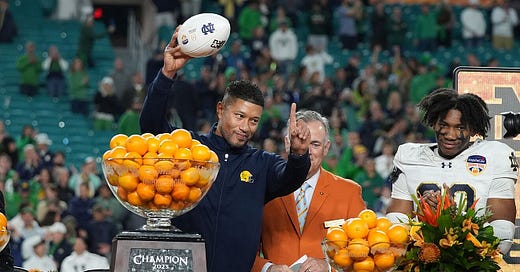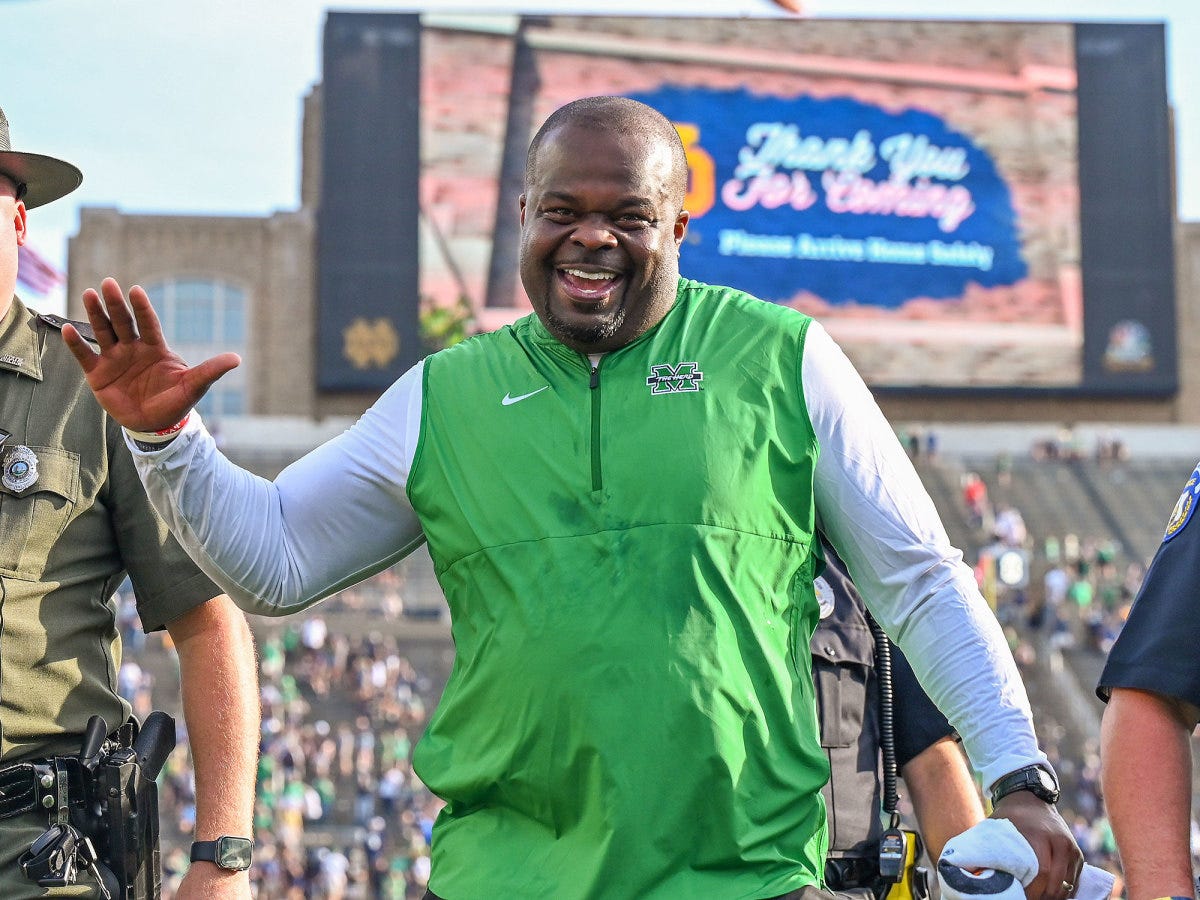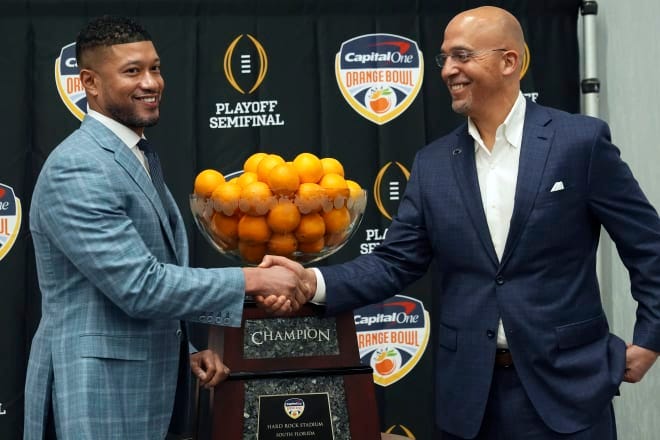Why Marcus Freeman's national title run matters
The Notre Dame coach will be the first Black man to coach in a national championship game. Why it took so long for this to happen can't be ignored
Marcus Freeman had every reason to smile on Thursday night in suburban Miami.
In his third year as Notre Dame’s football coach – a fortuitous point in the tenure of many past Fighting Irish coaches – his team was one of just four squads nationally still holding onto national title aspirations in the second week of January. He had a special occasion to look forward to, as well, with his 39th birthday awaiting Friday. Even when Notre Dame was flagged for a dubious pass interference call that wiped out an interception and led to a touchdown a few plays later, Freeman couldn’t help but flash a grin when looking at the officials.
By the end of the evening, there was one other thing that would make him (or anyone) happy.
Pushed through by a 41-yard field goal with seven seconds remaining, the Irish defeated Penn State 27-24 in the Orange Bowl, sending them to the College Football Playoff championship game on Jan. 20 and one step closer to the storied program’s first national title since 1988.
Though it was Freeman that came out on top, Thursday’s game was guaranteed to be a historical signifier in some way.
With Freeman facing off against Penn State and coach James Franklin, the national championship game was assured of featuring a Black coach for the first time ever at the FBS level. Now, we know who that trailblazing figure will be.
For Freeman himself, it’s a huge, career-defining moment, particularly for someone who’s still 12 months away from their 40th birthday. When Freeman, then only 35, was promoted to be the Notre Dame head coach after Brian Kelly left for LSU after the 2021 season, there were fair questions about whether he was ready for a job of that stature after just one year as the defensive coordinator in South Bend. When the Irish were stunned at home by Marshall in just his second game at the helm, those concerns only intensified. Even as recently as September, when the Irish again lost under the shadow of Touchdown Jesus to a heavy underdog from a Group of Five conference (this time, Northern Illinois), it was understandable to wonder whether he was a person capable of meeting the program’s justifiably lofty expectations.
Of course, a feat like this is bigger than just Freeman.
His accomplishment is happening during what remains a challenging time for Black coaches in college football, making Thursday’s triumph that much more notable.
During the 2024 season, only nine of the 70 Power Four programs had Black head coaches (I threw Oregon State and Washington State, both just a year removed from being in the Pac-12, in there.) That’s just 12.9%. If that’s stretched out to all 134 FBS programs, that figure’s slightly worse, dropping down to 12.5%, as just eight of the 64 Group of Five and non-Notre Dame independents had a Black coach.
During this year’s hiring cycle, 27 FBS programs had a head-coaching vacancy. Only three of those went to a Black coach, with each of those moves telling its own story.
Kennesaw State, which hired Jerry Mack, just wrapped up its first season at the FBS level and languished through a miserable 2-10 debut run. Florida International, which hired Willie Simmons, is among the most resource-depleted programs in the FBS. Despite winning 10 games and a conference championship, Charles Huff, the same coach who beat Freeman at Notre Dame Stadium two years ago, was not given a new contract at Marshall to replace his expiring deal and had to head to Southern Miss, one of the worst programs in the same conference he just won.
Freeman’s run to the championship game is the latest reminder of how far behind college football is among American sports, including its NCAA major-revenue sport peers, when it comes to racial diversity in top leadership positions.
This season, 25.9% of major-conference head coaches in Division I men’s college basketball are Black, more than double the percentage of their Power Four football counterparts.
That disparity goes beyond the present day.
While Freeman will be the first Black coach to lead his team to the FBS championship game, that historical marker was reached in men’s college basketball all the way back in 1982, four years before Freeman was born. That year, John Thompson guided Georgetown to the NCAA title game, where the Hoyas lost in the final seconds to North Carolina and some freshman named Michael Jordan. Two years later, Thompson made it back and, this time, he won, becoming the first Black coach to do so.
The same year Thompson and the Hoyas fell to North Carolina, the legendary C. Vivian Stringer took Cheyney State to the Division I women’s national championship, where it came up short against Louisiana Tech. The most remarkable aspect of that feat? It was the first-ever NCAA-sanctioned women’s national title game, meaning it took only one shot for women’s basketball to get to a place that the highest level of college football needed nearly 30 years of championship matchups to reach.
When Thompson made it to New Orleans for the 1982 Final Four, he was confronted with his achievement, which he didn’t see as one worthy of celebrating.
“I resent the hell out of that question,” he famously said when asked if he felt pride about what he had done. “It implies that I’m the first Black man to be accomplished enough and intelligent enough to do this. It’s an insult to my race. There have been plenty of others who could’ve gotten here if they’d been given the opportunity they deserved.”
His larger point gets directly to why it took so long for someone of Freeman’s racial background to make it to college football’s biggest stage. It wasn’t a lack of competence or acumen. Rather, it was a lack of opportunities.
The SEC, the most successful conference of the 21st century and the home turf of the sport’s most talent-rich region, had never had a Black coach until Sylvester Croom was hired at Mississippi State in Dec. 2003. To this day, the league has had only five Black head coaches in its 93-year history and is currently wrapping up its fourth consecutive season without a Black head coach at one of its programs. Barring any late, unexpected moves, that drought will stretch into a fifth season.
It wasn’t until 1981 that a major-conference program hired a Black head coach, when Northwestern brought in future NFL head coach Dennis Green. Over the next 12 years, only one other Black coach was hired by a program that’s now in one of the sport’s major conferences.
The wait for a Black head coach in the national championship has just as much to do with the kinds of programs that make the title game and their track record of hiring.
Of the 15 winningest programs in FBS history, only five have ever had a Black head coach (Notre Dame’s in that group.) In the past 30 years, those 15 programs have employed 80 full-time head coaches. Only six of them, or 7.5%, have been Black. Until 2013, only two Black head coaches had ever been hired at those schools (John Blake at Oklahoma and Tyrone Willingham at Notre Dame.) Both were fired before the start of their fourth season
Of the 11 programs that have won a national championship since 2002, only one has ever had a Black head coach. And that school, Florida State, gave that coach, Willie Taggart, all of 21 games before firing him midway through his second season while his white successor, Mike Norvell, had a worse record through his first 21 games and lived to tell the tale, having just wrapped up his fifth season there.
This isn’t to ignore progress that’s been made.
The landscape for Black coaches is undeniably better than it was even in the not-so-distant past. In 2009, only 15 years ago, there was just one Black coach (Miami’s Randy Shannon) in what were then the six power conferences, though surpassing that meager number should hardly be considered any kind of achievement.
The most recent hiring cycle notwithstanding, there’s at least some reason to believe better days could be ahead. Of the 190 people in major college football this past season who were offensive or defensive coordinators for their teams, 48 were Black, or 25.3%. Those men help make up college football’s proverbial coaching bench, with those positions regularly among the first an athletic director will turn to when looking to hire a head coach. If nearly a quarter of those posts are occupied by a Black man, it might only be so long before the head-coaching ranks might come close to that level of minority representation, though it’s quite possible that’s a naive calculation on my part.
For anyone like me who has written publicly about this subject, the question of why any of this matters invariably arises, whether in good faith or bad (let’s be honest – it’s usually the latter.)
It does matter, of course. There are matters of racial equity and justice to keep in mind, but beyond that, there are other, more practical aspects of all this to consider.
We so often think of these as games – and they are – but this is also an industry. We’re talking about jobs and livelihoods, ways for people to pay their mortgage, care for their families and find some sense of purpose in life.
A football field is one of the few places in this country where a player’s race truly doesn’t matter. As a broader enterprise, organized sports often pats itself on the back for being a true meritocracy, which it is far more often than it isn’t. In this day and age, if you can play and bring some value to a team based on your athletic gifts, you’ll find a home (with at least one notable exception.)
While that ideal may be embodied on the field, it frequently isn’t on the sideline. The best man isn’t always hired for the job, as many claim to care so much about, and the opportunities that have seemingly always been there for white coaches too often haven’t been for their Black counterparts.
As Freeman advances further in the playoff, he’s cognizant of the meaning behind what he and his team are doing.
“This isn't about one person,” Freeman said Wednesday at the pre-Orange Bowl press conference. “It takes a team. It takes a program. It takes a lot of people committing to something bigger than themselves to put your team in a position to be here, and I understand it, and I'm very grateful for it. If this creates more opportunities for other coaches, other minority coaches, great. It's great. It is great for the future generations of coaches, of college football coaches, of leaders. I am all for it, and I'm grateful to be a part of that.”
It’s worth keeping Freeman’s words in mind in the days and years ahead.
A barrier will be broken when the ball is kicked off on Jan. 20 in Atlanta and Notre Dame will be 60 minutes away from a national championship. Even if the Irish don’t win, merely getting there will have meant something.
The next time this happens, maybe it won’t be so novel. If all the dissenting voices of the past week or so are right about anything it’s that, hopefully, a Black coach reaching the pinnacle of the sport won’t require this level of attention because it’s been done before and will, hopefully, have been replicated in the years to come.
College football has a ways to go to get there and if it ever does, it will have this playoff to look back to as a turning point.
(Photos: La Presse, USA Today, Associated Press)






